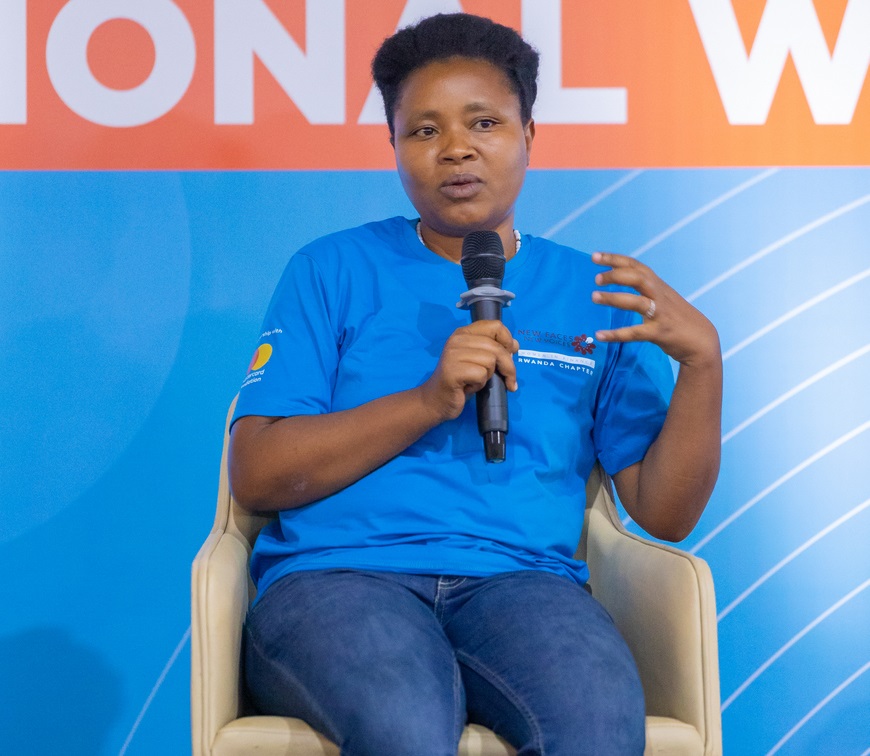Today, a woman drives a truck, oversees the construction of a building of unspecified height, serves her country in the military, leads major corporations, and beyond that, initiates a certain company. Listening to her progress could seem like navigating through thorns, but she perseveres.
All these roles were traditionally assigned to men, with the woman being the one who typically stays at home, often engaging in undervalued household chores.
During the celebration of International Women’s Day by New Faces New Voices, supported by the Mastercard Foundation to promote community development, Umutoni Nadine showcased her project and the challenges she encountered.
This woman works in poultry farming in the Rulindo District and sells chickens across different parts of the country, especially in Kigali City.
Through her company, Ijabo Poultry, Umutoni buys chicks, raises them, and in 45 days, the chickens are mature and ready for the market.
As of today, she can raise more than 1000 chickens per month, selling each for 7000 Rwandan Francs or 6000 Rwandan Francs depending on their weight, as most weigh around two kilograms or slightly less.
However, despite starting to make money, it wasn’t always smooth sailing because there was a time she almost gave up when her partners abandoned her. At that time, she had already lost over 8 million Rwandan Francs just getting started.
She began by purchasing a machine that could incubate 528 eggs. After buying it, she bought 300 eggs, but due to bad luck, only two chicks hatched, and the rest of the eggs went bad, which demotivated her to the point of considering quitting for another job.
She continued, changing tactics, asking people to bring eggs for incubation only to face losses of about 60% or 70%, which forced her to dig into her funds to cover the costs, not forgetting other expenses like electricity, thus multiplying her losses.
She said, “I would take money and pay others. However, we don’t get discouraged at home. We concluded that the problem wasn’t with our eggs, so we bought 200 chicks, raised them, but again they died when placed in the same machine. You see, those were all losses from 2015 to 2018.”
Umutoni tried changing strategies by acquiring a more capable incubation machine from Uganda, which could incubate over 4000 eggs, but she only put in about 1500. Fortunately, 1321 hatched.
They only sold about 200 of those chickens and raised the rest, which went well until, just a few days before selling them, COVID-19 struck.
With the lockdown enforced, hotels that bought from her closed, and everywhere shut down, leaving no market for the chickens, forcing her to sell at a loss, making only 900,000 Rwandan Francs from an investment of 2.1 million Rwandan Francs she made with two others.
Others quit, but Umutoni reinvested, starting again with 200 chickens, which again died successively after about 28 days, with just 17 days left to sell.
She recounted, “I’d go to the bridge, and someone would tell me 10 died. Then the next day, another 10. I’d visit the veterinarian, but it was futile. I spent a lot of money, and 78 chickens died that time, leading to another loss.”
What kept her trying was the market demand since all the chickens she had were sold. She decided to visit different farms to learn how they operate, starting again with 100 chickens.
Her newfound knowledge about proper medication for the chickens made those 100 grow, but she then faced market price fluctuations.
She said, “Sometimes, at the end of the year or the beginning, I can sell a kilo for 5000 Rwandan Francs, then it drops to 3500 Rwandan Francs. But I need to know that I profit regardless, seeking markets, but also needing cash since some clients don’t pay immediately.”
After all these losses, Umutoni is now making profits again, currently employing five permanent workers and others who come especially after the 45 days when the chickens are mature for slaughtering.


